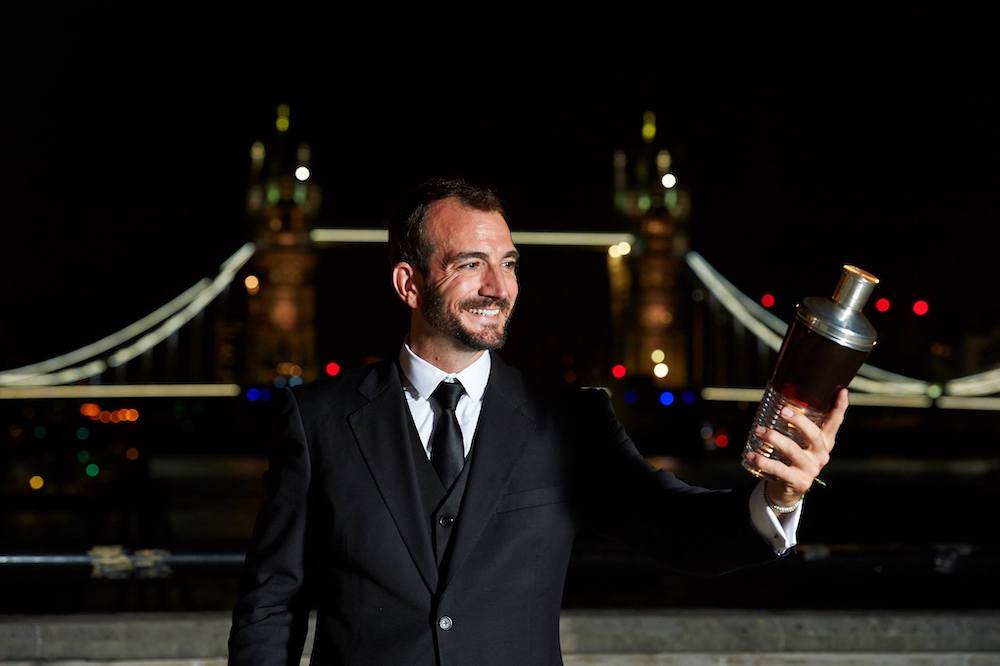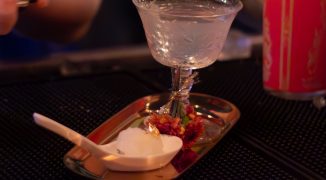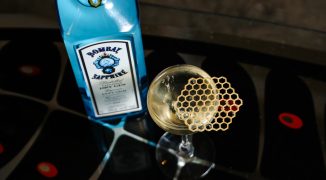Last month, Charles Joly kicked back with us over a glass of Scotch to share the wisdom he’s gleaned after 19 years in the business from bus-boy to barback to one of the most notable bartenders in the world. Joly, who worked as beverage director at the Aviary and now runs Crafthouse Cocktails, was the 2014 global winner of Diageo World Class — the largest and arguably most prestigious bartending competition in the world. Aside from that big win, Joly has participated in many competitions on both sides, as competitor and judge. In our December Shake-Up, he shared some of his insight about why all serious bartenders should try a competition, and the steps they can take to succeed. Here are some of the highlights:
Entering a competition will elevate your bartending game.
“Taking yourself out of your bar is going to expose you to new ideas and help you bounce your ideas off of other people. The big picture of this should be to become a better bartender, serve our guests in better ways, spike our creativity, explore what we want to do.”
Terrified? That probably means you should try it.
“Any time in life, the moments when we learn the absolute most and when we grow the most are those when we’re a little bit out of our comfort zone. The stuff that’s life-changing was probably preceded by a little bit of fear. When you put yourself into a competition setting, you’re working in some place you’ve never worked before, and when you get onstage in a competitive format, it’s like walking into a Friday night shift at midnight when you never had a chance to warm up. It takes a little bit of practice. You can sit and read all the great books out there, tune in to all the blogs, but actually getting your hands on things and putting yourself in situations that are a little uncomfortable will result in growth.”
Nothing beats the camaraderie (and, yes, the networking).
“There is no more supportive, more unified industry that has more fun than the bartending industry, and this is a fantastic way to get to know some other folks. As we know, networking is key in all industries, and it’s super key in hospitality. I don’t know many bartenders who have gotten jobs by filling out an application. As we grow globally, our styles are all meshing and influencing one another whether we’re aware of it or not. It’s a very cool thing to be able to impact one another, but to do it face to face, to get in a room with 40, 50, 60 bartenders all sweating the same way you are and who’ve all worked very hard to represent their countries, and then to spend a week with those like-minded individuals, is a really life-changing experience. It’s like two years worth of experience in ten days.”
It isn’t the end of the world if you fail. It’s actually a good thing.
“I certainly have lost far more of these things than I’ve won… but the good thing is, folks usually remember the ones you’ve won. You also don’t learn a whole lot from the ones that you’ve won — you really do get the most amount of learning in the ones where you tripped up a little bit. You’ll know where you work the most comfortably, and where you excel, but more importantly it’ll point out places where you should improve yourself. If you do a competition and you stumble a bit, you at least end up with a cocktail recipe in your book that maybe makes its way onto your next menu, you learn a little about yourself, and hopefully you’ve made some new friends.”
Don’t be afraid to experiment, but stick to your style.
“When you get onstage in a competition setting, you want to be extremely comfortable. The cocktail is just a part of that competition—you want to be a bartender, ultimately. You want to treat your judges as they’re your guests at your own bar. If you’re working on a technique you’re not super familiar with, you’re going to be worried about little things. That’s going to take away from the experience for the judges. You want to get it as close as possible to the experience you’d have in your own bar. If you’re going to use a new technique or something you don’t do every day, just make sure you nail it before you get to that competition setting. Trying to do too much or do stuff just for flash will get called out all the time. If you’ve never done spherification or you’ve never used smoke regularly, just make sure it counts. Make sure you have a good story behind it and that you know why you’re doing something. I think people sometimes try to go overboard and do a little too much in cocktail competitions, and oftentimes it’s things they’re not comfortable with. I would much rather see a more simple, perfectly balanced and executed cocktail than one that was overly fussy and executed in a less complete fashion or stumbled into like they’d only done it a few times.”
Read the rules, and then read them again.
“I’ve judged many competitions and I would say a solid 30% of competitors knock themselves out before they even get started because they don’t read the rules. Whether it’s number of ingredients, or inspiration for a drink, or a deadline, read everything. Treat it like a piece of Ikea furniture: if you try to put that thing together and you do not read the instructions first, you are probably going back to Ikea on a Saturday, or it’s going to fall apart.”
Tell a story that you earnestly believe in.
“Have a story. Sincerity is everything. You need to be able to sell your drink and yourself, and it’s very easy to sell something that you believe in. We spend hours on end looking across the bar at our guests, so we become very adept at reading when people are not being sincere. You’ll be more comfortable when you’re actually delivering that.”
Put yourself in the judges’ shoes.
“If you know what you’re going to be judged on, make sure you’ve checked off all those boxes. Put yourself in the role of a judge. When you know the scoring criteria and you know the rules, you almost have the answer sheet to the test. Use that to your advantage as much as possible.”
Practice while you work.
“When I had a very short amount of time to prepare for the World Class globals, I worked in all the competition cocktails I was going to do any time I had a dealer’s choice. I would make my guests my guinea pigs, and people get really excited about that, especially if they know it’s going into a competition.”
Get your mind right.
“Keeping your head on straight is probably one of the most difficult but important things to do. Whatever your ritual is before you get behind your bar at night, whether it’s tying your tie or listening to music, do it. The ones I’ve done the best in, I was present. The ones where I left something on the table, it was a whirlwind. Be present, be in the moment. That’s part of being a bartender: organization, keeping a level head. If your barback cuts his finger or breaks a glass in the ice, it’s not like you’re going to throw your hands up and walk out in the middle of a busy Friday night. You never let them see you sweat. It can be complete chaos back of house but what we put forward to our guests always has to be very level.”
Pack wisely.
“Bring everything. Even if you’re told something is going to be there, it may or may not be there. In terms of glassware, bring at least one extra glass. Bring an extra garnish, because if you don’t, you’re going to drop one. Liquids, I use heavy-gauge plastic bags and heat-seal them. Lighter than glass and less apt to break, they lay flat; you can pack more. You can put them in a hard-side container so they don’t get punctured. But if you end up with ginger liqueur all over your suit, please don’t write me any hate mail.”
In conclusion? Just go for it.
“Get involved. Throw your hat in the ring. Go do it to win, but do it to become a better bartender and give our guests a better experience. Do it to expand our knowledge base. Do it to get our skill set a little more diverse. Do it to meet other amazing bartenders from around your city or around the country or around the world. Just get involved, and figure out how to find your own little niche and stay true to it.”
Watch the full video below:
Don’t miss our next Shake Up on Wednesday, January 20 at 2 p.m. CST. International vermouth expert Giuseppe Gallo will lead participants through a guided virtual tasting of vermouth, discussing its history, heritage, production, legislation and market development in EU and USA.




